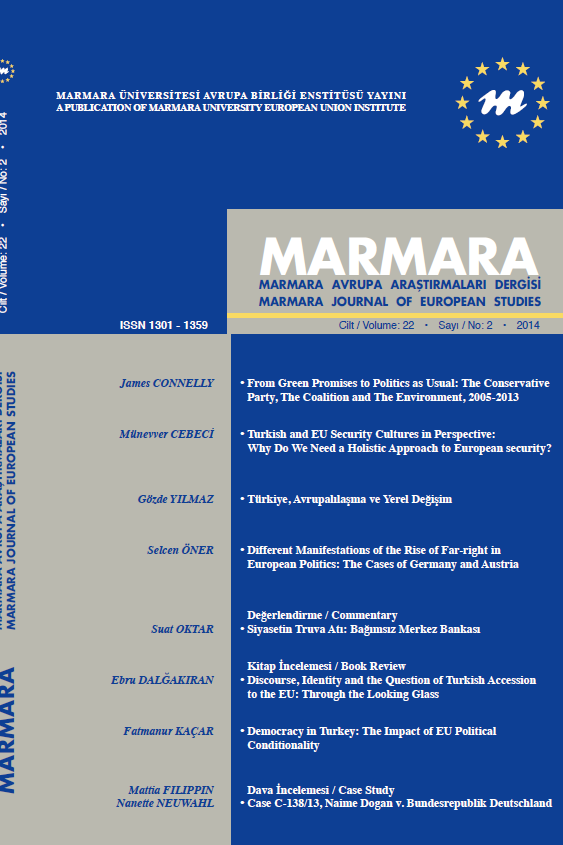AB’NİN DİJİTAL DENKLEMİ: AB’NİN GÜÇ, BİLGİ VE İKTİDAR İLİŞKİLERİNİN YÖNETİMSELLİK ANLAYIŞI IŞIĞINDA YENİDEN DÜZENLENMESİ
Avrupa Birliği (AB) dijitalleşme ve teknolojik gelişimle uyumlu olabilmek için siyasal ve ekonomik entegrasyonunu dijital ve teknolojik politikalarla bütünleştirmektedir. AB kendini dijitalleştirirken ve teknolojiye uyumlu hale getirirken aynı zamanda vatandaşlarını, üye devletlerini ve küresel teknoloji şirketlerini söz konusu uyumlaşmanın bir parçası haline getirmeyi amaçlamaktadır. Bu yeni yaklaşımıyla AB, dijital neoliberal yönetimsellik uygulamaları inşa etmektedir. AB’nin dijital neoliberal yönetimsellik uygulamaları iktidar, güç ve bilgi denklemini veri odaklı bir düzen içinde ele almaktadır. Çünkü veri bugünün dünyasında bilgiyi belirlemekte, özneyi şekillendirmekte ve uluslararası sistemi değiştirmektedir. Böylesi bir durumda AB; kendine has iktidar modelleri ortaya koymakta, uluslararası sistemi kontrol ve disipline etmeye çalışmaktadır. Dolayısıyla makalenin amacı, AB’nin dijital alanda yönetimselliğini devam ettirebileceği yeni dispozitifler geliştirdiğini, AB’nin dijital politikaları üzerinden izah etmeye çalışmaktır. Foucault’nun post-yapısalcı yaklaşımını benimseyen makale, giriş ve sonuç bölümlerinin yanı sıra dört ana bölümden meydana gelmektedir. İlk bölümde Foucault’nun terminolojisine yer verilmektedir. İkinci bölümde Foucault’nun neoliberal yönetimsellik anlayışı analiz edilmektedir. Üçünde bölümde dijitalleşme, veri ve birey ilişkisi ele alınmaktadır. Dördüncü bölümde ise AB’nin dijitalleşmeye ilişkin yönetimsellik uygulamaları incelenmektedir.
THE EU’S DIGITAL EQUATION: RE-REGULATING THE EU’S KNOWLEDGE, POWER, AND SOVEREIGN RELATIONS IN LIGHT OF ITS UNDERSTANDING OF GOVERNMENTALITY
The European Union complements its political and economic integration with digital and technological policies in order to align itself with digitalization and technological progress. As the EU digitalizes and harmonizes itself with technology, it aims to incorporate its citizens, member states, and global technology companies within this process of harmonization. With this new approach, the EU establishes the practices of neoliberal digital governmentality, which engage with the equation of sovereignty, power, and knowledge in a data-centric order. This is because, in today’s world, data determines knowledge, shapes the subject, transforms the international system. In such a situation, the EU lays out its own particular models of power and attempts to control and discipline the international system. Hence, this article aims to explicate – through the EU’s digital policies – that the EU has developed new dispositifs that will allow it to maintain its governmentality in the digital sphere. Embracing Foucault’s post-structuralist approach, this article consists of four main sections as well as the introduction and conclusion. The first section includes Foucault’s terminology. The second section analyses Foucault’s understanding of neoliberal governmentality. The third section engages in the relationship between digitalization, data, and the individual. The fourth section examines the EU’s practices of governmentality with respect to digitalization.
___
- References:
- Agamben, G. (2009) What is an Apparatus and Other Essays, D. Kishik, and S. Pedatella, (trans.), (Standford: Standford University Press).
- Akpınar, M. E. (2022) “A Review on The Relationship of Big Data and Cambridge Analytica”, İletişim Bilimi Araştırmaları Dergisi, 2(1): 56-63.
- Albrecht, J. (2016) “How the GDPR Will Change the World”, European Data Protection Law Review, 2(3): 287-289.
- Aldhouse, F. (1999) “The Transfer of Personal Data to Third Countries Under EU Directive 95/46/ EC”, International Review of Law, Computers & Technology, 13(1): 75-79.
- Arnason, G. (2012) “Biopower”, in R. Chadwick (ed.), Encyclopedia of Applied Ethics, (London: Academic Press).
